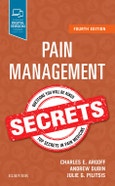- Covers the full range of essential topics in pain management for in-training or practicing professionals.
- Top 100 Secrets and Key Points boxes provide a fast overview of the secrets you must know for success in practice and on exams. - Portable size makes it easy to carry with you for quick reference or review anywhere, anytime. - Fully updated throughout, with new chapters on the latest areas in pain medicine, clear illustrations and figures, and a list of current websites that expedite study and review. - Written and fully updated by internationally known pain medicine experts, including new editors Drs. Andrew Dubin and Julie Pilitsis. - NEW! Expert ConsultT eBook version included with purchase. This enhanced eBook experience allows you to search all of the text, figures, and references from the book on a variety of devices.
Table of Contents
I. OVERVIEW1. Definitions, Ronald Kanner, MD
2. Classification of Pain, Robert A. Duarte, MD
3. Basic Mechanisms, Allan Basbaum, PhD
4. Topiceuticals, Charles E. Argoff, MD
II. CLINICAL APPROACH
5. History Taking in the Patient with Pain, Howard S. Smith, MD and Andrew Dubin, MD
6. Physical Examination of the Patient with Pain, Howard S. Smith, MD and Andrew Dubin, MD, MS
7. Pain Measurement, W. Cranford Clark, PhD, Sita S. Chokhavatia, MD, Abbas Kashani, MD, and Susanne Bennett Clark, PhD
8. Psychological Assessment of Chronic Patients, Dennis Thornton, PhD
III. CLINICAL SYNDROMES DEFINED BY PAIN
9. Neuroimaging in the Patient with Pain, Howard S. Smith, MD
10. Tension-Type Headache, Richard B. Lipton, MD, and Lawrence C. Newman, MD
11. Migraine, Richard B. Lipton, MD, and Lawrence C. Newman, MD
12. Cluster Headache, Lawrence C. Newman, MD, and Richard B. Lipton, MD
13. The Paroxysmal Hemicranias, Lawrence C. Newman, MD, and Richard B. Lipton, MD
14. Subarachnoid Hemorrhage, Ronald Kanner, MD
15. Brain Tumor Headaches, Ronald Kanner, MD
16. Increased and Decreased Intracranial Pressure, Ronald Kanner, MD
17. Temporal Giant Cell Arteritis, Robert A. Duarte, MD
18. Headaches Associated with Systemic Disease, Robert A, Duarte, MD
19. Trigeminal Neuralgia, Robert A. Duarte, MD
20. Glossopharyngeal and Other Facial Neuralgias, Robert A. Duarte, MD
21. Low Back Pain, Ronald Kanner, MD
22. Neck and Arm Pain, Ronald Kanner, MD and Gary McCleane, MD
23. Abdominal Pain, Ronald E. Greenberg MD
24. Chronic Pelvic Pain, Helen Greco, MD
25. Fibromyalgia and Myofascial Pain, Mark Thomas, MD, and Ronald Kanner, MD
IV. SYNDROMES IN WHICH PAIN IS A SIGNIFICANT COMPONENT
26. Postoperative Pain Management, Michael Hanania, MD
27. Cancer Pain Syndrome, Gilbert R. Gonzales, MD
28. Pain in Rheumatoid Arthritis and Osteoarthritis, David S. Pisetsky, MD, PhD and Gary McCleane, MD
29. Neuropathic Pain, Russell K. Portenoy, MD and Ricardo Cruciani, MD, PhD
V. PSYCHOLOGICAL SYNDROMES
30. Psychological Syndromes, Dennis Thornton, PhD
VI. SPECIAL PATIENT POPULATIONS
31. Pain in Children, Patricia A. McGrath, PhD, and Stephen C. Brown, MD
32. Pain in the Older Patient, Ronald Kanner, MD
VII. PHARMACOLOGIC MANAGEMENT
33. Nonsteroidal Anti-inflammatory Drugs, Robert A. Duarte, MD
34. Opioid Analgesics, Ronald Kanner, MD
35. Addiction and Pain Management, Robert Kanner, MD
36. Regulatory Issues, Ellen Cooper, MS
37. Adjuvant Analgesics, Brian Thiessen, MD, and Russell K. Portenoy, MD
VIII. NONPHARMOLOGIC MANAGEMENT
38. Temporary Neural Blockade, Michael Hanania, MD, and Martin R. Boorin, MD
39. Permanent Neural Blockade and Chemical Ablation, Michael Hanania, MD
40. Sympathetic Neural Blockade, Meir Chernofsky, MD, and Michael Hanania, MD
41. Intraspinal Opioids, Zahid H. Bajwa, MD, Stephen A. Cohen, MD, Carol A. Warfield, MD, and Gary McCleane
42. Neurostimulatory and Neuorablative Pocedures, Jason E. Silvers, BS, and James N. Campbell, MD
43. Psychological Constructs and Treatment Interventions, Dennis Thornton, PhD
44. Physiatric Modalities in Pain Management, Mark A. Thomas, MD
45. Physical Modalities: Adjunctive Treatments to Reduce Pain and Maximize Function, Bryan J. O'Young MD, Mark A. Young MD, Jeffrey S. Meyers, MD, Steven A. Stiens, MD
46. Pain Clinics, Nelson Hendler, MD, MS
47. Interventional Pain Management, Charles E. Argoff, MD and Gary McCleane, MD
48. Complementary and Alternative Medicine, Robert A. Duarte, MD
Index








